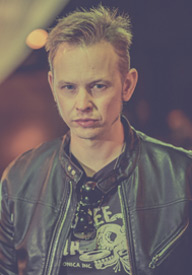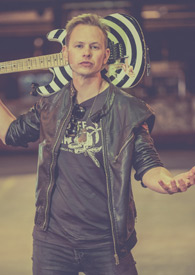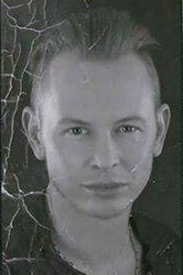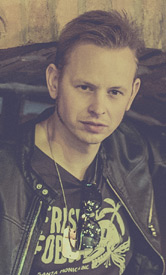|
Interview conducted February 13 2018 Interview published April 22 2018 |
![]()
"You can always replace a riff. A good riff doesn't make a song."
The melodic rockers W.E.T. put out their new album Earthrage on March 23rd and Metal Covenant got on the phone with guitarist, songwriter and producer Erik Mårtensson to listen to what he had to say about the band's latest creation.
![]()
Tobbe: If someone has listened to the first two albums, in what way will they notice that this record is following the band's footprints?
Erik: Well, it's us playing on it. [Laughs] Just with that we're pretty much home safe. The combination of musicians is what makes it become what it is, you know. I write the songs, for the most part anyway, and Jeff [Scott Soto] is singing, and we play, and it's the same musicians since the start. That's what happens when you put together different people, you get a certain sound, you know.
 Tobbe:
It's been 5 years since Rise Up was out and the material to the new record,
is it written during this long time bit by bit or is it more or less all
newly written?
Tobbe:
It's been 5 years since Rise Up was out and the material to the new record,
is it written during this long time bit by bit or is it more or less all
newly written?
Erik: Everything is made last spring and up to June last year. Then we took a summer break and I started to record some parts and after the summer we were tracking the drums and started recording all the instruments and Jeff laid down the vocals. So there's not one single old idea on this one. Everything is new.
Tobbe: Would you use something old, if you just had some stuff laying around?
Erik: If I had a good song that would fit the W.E.T. record, absolutely! But there are no left-overs. I write songs in a way that those songs that don't come out good I don't finish. I don't waste time on them and I feel, you know, halfway through or when I'm recording demos, like "No, this is not good." and then I just give up on them. There's nothing that is as time-consuming as to put down time on songs that aren't good enough.
Tobbe: So I guess you have the ability to know what's good or not, even if you're writings songs on your own?
Erik: Yes, it's always like that, with everything I write. You just have to write songs you like yourself. If I'm not like "Yes. This is cool!", then there is no reason to go any further on that song. Of course, every song isn't the coolest thing you have ever heard, but you have to feel that there is some substance and that I like to listen to the song. If I get bored halfway through a song and start to think about something else, then it's not a good sign, you know. And I do that on a whole lot of songs on other bands' records, that have a lot of fillers that you just don't care about and you're not sitting there with rapt attention, you know. And maybe you're not rapt over the whole new record either, but if you're interested yourself, it's a good sign.
Tobbe: Is it the actual melody in the song that you find boring, or is it maybe the riffs, or whatever, you know?
Erik: You can always replace a riff. A good riff doesn't make a song. For me it is the melody. The vocals are what's most important, in a sense, in this type of music. Maybe not always with Slayer, but in AOR the vocals are more important. Well, it's important in all genres, but in other genres timing and rhythmization become more important, you know. But you can replace the riffs and it's pretty easy to write good riffs, but if the melodies aren't there nothing is there, you know. It doesn't matter how hard you play or how many guitars you add; if the little things don't work, it won't work out in the end, you know.
 Tobbe:
Did you know already at an early stage that you were going to put down
some lead vocals on the album too and especially in the first song, Watch
The Fire?
Tobbe:
Did you know already at an early stage that you were going to put down
some lead vocals on the album too and especially in the first song, Watch
The Fire?
Erik: Well, we did that on the last album a little bit and it really fits this song. It wasn't meant to be a single and it was just one of the songs, you know. But then it became the song that everyone thinks is the strongest one, you know, as a first single. It was clear W.E.T. in a way and what we stand for and what our fans like, you know. So there was no plan behind it, that I was going to sing it just because it was going to be a single, but we did it in a song where it felt right, you know. And the whole phrasing; it was kind of easy to just build it like that.
Tobbe: In the end of the songs, in the final minute maybe, you pretty often raise the tempo or have a different kind of swing to it or have a guitar part and is this something you're looking for or does that just seem to happen?
Erik: When the third time comes, and to not get the feeling that you've heard it a hundred times before, I try to make a different variant with it. I like it and I sometimes do that with my songwriting, you know. But without going too far and often it's just variants of the choruses or "I just came up with a cool guitar melody. Let's add that one to this song.". So there's no set plan to it, but I personally like when people do that. Maybe the first time it might be confusing, thinking strictly commercially, but if you listen to the record 5 or 6 times you start to appreciate those parts a whole lot.
Tobbe: Some musicians say that ending a song is the hardest part when writing a song? Is this something you would agree to?
Erik: Yes, from time to time. Some songs are super easy to end and some songs get stuck in kind of a loop and you can't get out, you know. And worst case scenario is to fade out, you know. [Laughs] It's kind of lame and you probably ought to find something better. But sometimes you're just unable to find something better and everything just gets worse. The first song, Watch The Fire, it fades out. There's no way to get out of it, without coming out bad. That song could have lasted for a minute longer without the listeners actually taking too much notice of it, you know. I tried a lot of different endings for it, before I resigned, because I think that's really a last resort, you know.
 Tobbe:
When you're writing songs for W.E.T., to what extent do you take into
account that Jeff is gonna sing the songs and not yourself?
Tobbe:
When you're writing songs for W.E.T., to what extent do you take into
account that Jeff is gonna sing the songs and not yourself?
Erik: Not at all, actually. I think about the key to make it suitable for Jeff, but that's when the song idea is done. In the beginning it can be pretty much anything. I can sing pretty high and go a lot higher than him and make a song, but when it's time for Jeff I transpose and put it where it feels right. During the actual songwriting, the creative phase, I don't think about it. So my first demo can have a completely different key and so, and then I change it. I often want to put it in a key that's suitable for me, because I want to feel that it sounds good and feels right, and then I can go lower to make it suit Jeff better, because he will sound good in a lower key, but I won't. So I often make two versions, regarding the W.E.T. songs, you know.
Tobbe: W.E.T. hasn't played live so much over the years, and I realize that you have other things to do, but do you guys at least have any kind of loose plans to maybe do some more gigs? I guess you have talked about it anyway.
Erik: Yes, we have absolutely talked about it, but at this point, I would say that there's pretty much no chance of us playing live. It's absolutely not carved in stone and we have never said "We will never play live again.", but Jeff has Sons Of Apollo, who he's out with all the time. And Jeff thinks this music is tough to sing live, because we go high in range and he thinks it's too arduous to do this nowadays and he prefers to stay lower. There's one thing doing it in the studio where you can take a break in between. You know, it's like with Eclipse, where the songs are just miserable to sing live and you really have to be in great shape, and Jeff, and God knows he can sing the right tone, but you change over the years and everyone gets lower, some people more than others, you know.
And Jeff lives in L.A. and to just get him over here it's $1200-1500 and you have all the rehearsing and it's quite a lot of work coming to it. Frontiers really wanted us to play on their festival, but we just can't take only one gig. It's too much work to rehearse and everything and a 90 minute set takes a whole lot of effort to put together and to make it really, really good. So I said that I just can't do it and we would have to play a whole lot more gigs to make the effort worth it, but then Jeff thinks it's too hard to do it, so we, simply put, just don't do it.
Tobbe: Will there be another 5 years before we get to see the next W.E.T. album?
Erik: I think we're just happy to have put this one together. But we will absolutely try to make another one. I'm pretty sure of it.
 Tobbe:
A lot of things can happen in 5 years in the songwriting factory.
Tobbe:
A lot of things can happen in 5 years in the songwriting factory.
Erik: Yes, maybe I will get total writer's cramp and make a totally shitty record. [Laughs] Well, I probably won't release that one. Or maybe we will make, like a "Music From The Elder". Total fucking symphony. So incredibly bad, you know. It would be quite fun actually. And if I want to do something completely different… I mean, I write other types of songs occasionally. When I have the time to fool around a little bit I can do something really different and there are some funny work, that has nothing in common with this genre, in my map of songs here, you know.
Tobbe: Do you think you will ever go more towards writing songs for other artists?
Erik: No, I don't think so. To only write songs for other artists; there's really no market for that anymore, you know. And I'm not interested in writing Japan hits. I think that's so boring, you know. I despise that business, like big companies trying to earn as much money as possible and there's nothing there that's close to the heart for the people doing that and it's just about total commercialism. And that's not the reason why I work with music and I think that would kill my creativity completely, you know.
And on streams you don't make any money as a songwriter. If you wrote a song before and it came out on a decent record, it at least sold physical albums and you received mechanical rights when it was printed. But with streaming, if you have, like, song 12 out of 13, it won't generate any money and it's not worth the effort. And especially in melodic rock; it's great that all the fans listen, but it's nothing that will pay your bills, if you would only write songs for other people. But on the other hand I love to mix records and record and produce and the whole creative part and in this you can get an economy and it's also really fun.
Tobbe: Today's most brutal question: You take part in mostly 4 projects, W.E.T., Eclipse, Ammunition and Nordic Union and the 4 singers, Jeff, yourself, Åge Sten Nilsen and Ronnie Atkins, would you dare to rank them quality-wise from best to worst?
Erik: You know, I don't know. They're so different from one another. They're good in so different ways. Strictly singing-wise, technically, Åge is undoubtedly the best singer. I would absolutely say that. He is outstanding as a singer. And Ronnie, for example, is maybe not the most technically skilled singer, but his character is fantastic and his voice: you get sucked in and you believe in it. And that goes for Åge's voice too. So everyone has his own character.
And it's the same with Jeff. You can instantly hear that it's him when he starts singing. A special character. It's a privilege to work with such singers. Myself, personally, I'm not a singer. Once upon a time I was just the one who was the least bad, you know. [Laughs] That's how I became a singer. I remember when we were rehearsing for Eurovision Song Contest and "How the hell did I end up here? I hate to sing.". [Laughs]
Tobbe: I would say you manage quite well regarding being the least bad one.
Erik: It didn't sound good when I sang, but when the other guys sang it was really terrible. Once before I sang pretty bad. I'm not a natural singer. I don't have a natural talent for singing and I have had to push forward sound that doesn't come out really bad all the time and then I just try to avoid sounding as bad as possible, you know. So in comparison to the other guys I don't stand a chance, strictly singing-wise, but I have kind of practiced my way to some sort of character.
Related links:
www.facebook.com/wetofficialpage
![]()